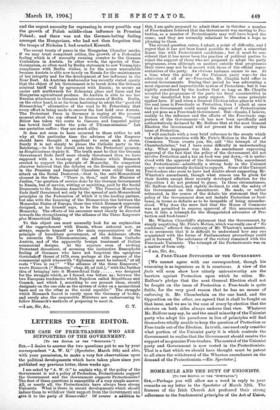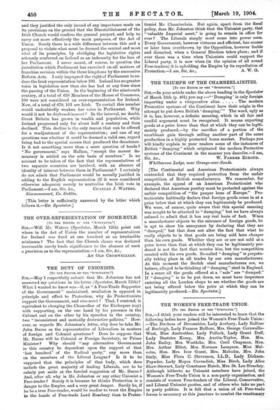HOME-RULE AND THE DUTY OF UNIONISTS.
(TO THM EDITOR 0? THE "spears:ma.") Sni,—Perhaps you will allow me a word in reply to your remarks on my letter in the Spectator of March 12th. The framers of the Irish Church Act professed their strong adherence to the fundamental principles of the Act of Union,
and they justified the only inroad of any importance made on its provisions on the ground that the Disestablishment of the Irish Church would confirm the general purport, and help to carry out more effectively the main purposes, of the Act of Union. Surely there is a wide difference between this and a proposal to violate what must be deemed the central and most vital of its principles, by abridging the legislative rights solemnly conferred on Ireland as an indemnity for the loss of her Parliament. I never meant, of course, to question the jurisdiction which Parliament has exercised on all matters of franchise revision within the three kingdoms by the successive Reform Acts. I only impugned the right of Parliament to re- duce the Irish representation below 100. Ireland has no greater voice in legislation now than she has had at any time since the passing of the Union. In the beginning of the nineteenth century, of a total of 658 Members of the House of Commons, 100 were not considered an over-representation for Ireland. Now, of a total of 670, 103 are Irish. To curtail this number would undoubtedly weaken her voice in Parliament. Why would it not be disfranchisement ? In the interval, no doubt, Great Britain has grown in wealth and population, while Ireland progressed only for about half a century and then declined. This decline is the only reason that can be offered for a readjustment of the representation ; and one of my questions was whether it could be deemed a valid one, regard being had to the special causes that produced the decadence. Is it not something more than a mere question of heads ? "No government," says Hallam, "except the merest de- mocracy is settled on the sole basis of numbers." Is no account to be taken of the fact that the representatives of two separate countries are involved, with an absence of identity of interest between them in Parliament P I certainly do not admit that Parliament would be morally justified in adding to the English representation (if it were considered otherwise adequate) merely to neutralise the Irish vote in [This letter is sufficiently answered by the letter which follows it.—En, Spectator.]











































 Previous page
Previous page